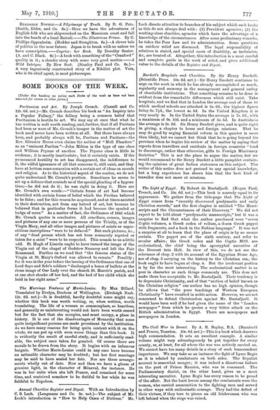The Light of Egypt. By Robert de RustafjaelL (Regan Paul,
Trench, and Co. 10s. 6d. net.)—This book is scarcely equal to its appearance. We gather from the title-page that The Light of Egypt comes from "recently discovered predynastic and early Christian records," and the first chapter is entitled "The Manu- scripts and the Circumstances of their Discovery." We did not expect to be told about "predynastic manuscripts," but it was a surprise to find that what the author purchased were "seven Coptic volumes, a Greek codex of vellum, a dozen Greek papyri with fragments, and a book in the Nubian language." It was not a surprise at all to learn that the place of origin is by no means certain. The papyri are of the sixth century, and refer to secular affairs; the Greek codex and the Coptic MSS. are ecclesiastical, the chief being the apocryphal narrative of the Descent into Hell. In view of this, we do not see the relevance of chap. 2 with its account of the Egyptian Stone Age, nor of chap. 3 carrying on the history to the Christian era; the book ought to have begun at chap. 4. But the irrelevant portion is by far the most interesting. The ecclesiastical matter is as poor in character as such things commonly are. This does not make them less acceptable to Mr. Rustafjaell. Their tendency is to depreciate Christianity, and of that "section of belief known as the Christian religion" our author has no high opinion, though he allows that "the pure teachings of Western European Christianity " have resulted in noble action. However, we are not concerned to defend Christendom against Mr. Rnstafjaell. It would have been well if he had given the name of the " London newspaper" from which he quotes a very bitter attack on the British administration in Egypt. There are newspapers and newspapers in London.










































 Previous page
Previous page